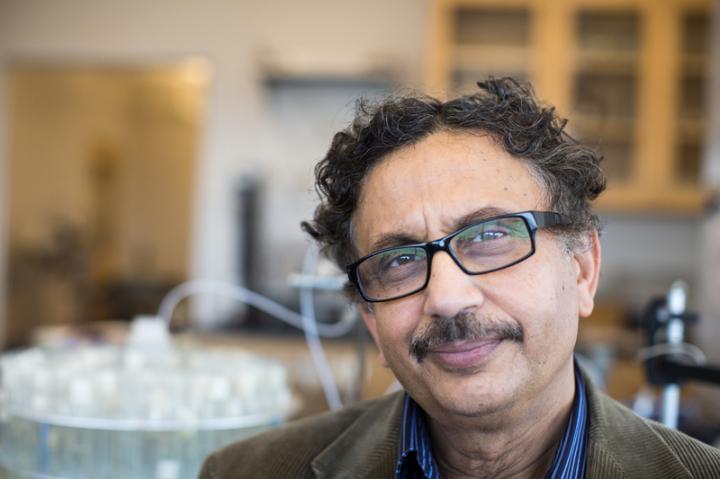Water technology expert returning to India to explore new opportunities to deploy HIX-Nano to mitigate drinking water crisis in affected communities and improve wastewater recovery, reuse

Credit: Lehigh University
For the second time in his distinguished career, Arup K. SenGupta, P.C. Rossin Professor in the Department of Civil and Environmental Engineering and the Department of Chemical Engineering at Lehigh University’s P.C. Rossin College of Engineering and Applied Science, has received a grant through the Fulbright Scholar Program to conduct research in India.
Beginning in January, SenGupta will spend the Spring 2020 semester collaborating with faculty members at the Indian Institute of Technology in Guwahati (IIT-G) associated with its Center of the Environment. His work will focus primarily on exploring the implementation of technology developed at Lehigh to transform wastewater into usable water with minimum energy consumption.
SenGupta and his research team invented Hybrid Ion Exchange Nanotechnology (HIX-Nano), a filtration nanotechnology resin that removes arsenic and fluoride from water. The technology is the basis of Drinkwell, a tech-driven social enterprise that uses the filtration system and a network of water kiosks to bring access to clean water to communities in countries including Bangladesh and India. SenGupta launched the startup in 2012 in partnership with two Fulbright alumni, Minhaj Chowdhury and Mike German ’17 PhD. According to the Global Innovation Fund, “the innovation is solving a major global crisis affecting millions of people living on less than $5 a day” in South Asia.
The Fulbright Program, which aims to increase mutual understanding between the people of the United States and the people of other countries, is the flagship international educational exchange program sponsored by the U.S. government.
“Lack of access to safe drinking water is recognized as a core contributor to a vicious cycle of poverty in marginalized communities globally,” says SenGupta, who has led the installation of hundreds of community-operated arsenic treatment systems across Southeast Asia through his own nonprofit, the Tagore-SenGupta Foundation. “The continued work at Lehigh University demonstrated that the use of appropriate robust technology and a transparent economic model with community empowerment may transform the crisis into an economic opportunity while providing safe drinking water.”
SenGupta previously conducted research on mitigating arsenic and fluoride in groundwater in India as a U.S. Fulbright Scholar from December 2011 to April 2012 at the Indian Institute of Science in Bangalore.
###
About Arup K. SenGupta
SenGupta received a bachelor’s in chemical engineering from Jadavpur University in Kolkata, India, and a master’s and doctorate in environmental engineering from the University of Houston. His research in environmental processes and sustainable materials has received recognitions from national and international organizations, including the Lawrence K. Cecil Award from the American Institute of Chemical Engineers in 2009, the Grainger Challenge Award from the National Academy of Engineering in 2007, the Intel Environmental Award for Technology Benefiting Humanity in 2012, and the VentureWell Sustainability Impact Award in 2016, among others. SenGupta currently holds ten U.S. patents and was the recipient of Lehigh University’s Libsch Research Award in 1995 and the Hilman Faculty Award in 2013. SenGupta is a fellow of the National Academy of Inventors, the American Institute of Chemical Engineers, and the American Society of Civil Engineers.
Related Links
- Rossin College Faculty Profile: Arup K. SenGupta
- Fulbright Scholar Program: Arup SenGupta
- Website: Drinkwell
- Website: Tagore-Sengupta Foundation
- Website: Indian Institute of Technology in Guwahati
Media Contact
Katie Kackenmeister
[email protected]
Original Source
https:/




